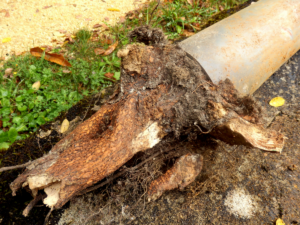
How Do I Know If I Have a Sewer Line Problem?
While a horrible stench wafting through your kitchen is a clear sign of a sewer disaster, there are less obvious indicators that your sewer line may be having issues. This hidden problem can lurk unseen, leading to major damage and costly repairs. As a homeowner, you need to pay attention to drain clogs, unusual odors, and other signs of an impending sewage problem.
For help with emergency repairs, reach out to Benjamin Franklin Plumbing.
Major Signs of Sewer Line Problems
Sewer-related problems aren’t just a smelly annoyance. Because of the bacteria, viruses, and other pathogens in sewage, they can pose a major risk to your family’s health. If you notice any of the following signs, reach out to our team of experienced plumbers for immediate help with your sewer line clogs and drain cleaning.
Multiple Drains Are Backing Up at the Same Time
There’s an old saying that you shouldn’t immediately think about zebras when you hear the sound of horse hooves. When it comes to drains, the most likely cause is often the right diagnosis. If you have multiple clogged drains at once, it is improbable that each drain developed a completely random clog at once.
The more likely reason is that a single clog in your sewer line is causing the rest of the system to back up. If you get sewer line cleaning, your clogged drains will cease to be an issue.
You Notice the Scent of Sewage Inside or Outside of Your Home
Your garden should smell of gardenias and lilies. If the scent of sewage starts seeping into your home or yard, don’t delay. You need a professional plumber to find the sewage leak so that you can prevent additional damage and eliminate unpleasant odors.
There Are Lush, Green Patches or Sinkholes in the Yard
There are many hidden signs of sewer leaks that you should be aware of. When sewage leaks out of a pipe, the fluids nourish the grass. This causes the surrounding grass to be especially verdant and lush.
Sewer lines can also lead to sinkholes if a leak is present. The leak triggers soil erosion, which eventually causes cavities within the ground. Before long, these cavities can connect and form sinkholes.
Your Home Experiences Frequent Toilet or Drain Clogs
Unless there is an obvious reason why you keep dealing with a toilet or drain backup, you need to investigate underlying problems. Regular clogs aren’t normal, so you may have sewer line clogs you need to address.
You Can Hear Gurgling Noises in Your Pipes or Toilets
Do you notice gurgling noises when no one is actually flushing the toilet or running water? Gurgling occurs when there is trapped air that has to be released. Often, this happens because the sewer line is clogged and full of water.
There Is Tree Root Intrusion
If you have a clogged sewer line, it’s wise to look at the trees and bushes in your yard. Studies have shown that plant roots grow in the direction of water, thanks to a process known as hydrotropism. Once the tree roots reach your sewer lines, they can eventually cause leaks and tiny holes to develop.
You Have Cracks in Your Foundation or Walls
When you have sewer line clogs, it can cause increased pressure in the sewer line. This pressure can result in cracks in your foundation and walls.
Cracks can also form because of shifting earth. Leaky sewer lines can cause the movement of soil and the development of cavities. This movement can destabilize your walls and foundation, leading to cracks.
What To Do If You Suspect a Sewer Line Problem
If you believe that you may have sewer line clogs or leaks, you should get help right away. Unfortunately, a sewer line clog is unlikely to go away on its own. The clog can even cause other waste to get backed up, leading to worse problems in the future. To deal with the sewer line issue, remember the following steps.
- Turn off the water main so that you don’t worsen the problem.
- Note any symptoms.
- Call a licensed plumber who has different methods of cleaning your drains.
- Report the symptoms to the plumber. Then, follow their advice.
To prevent future problems, use the following best practices.
- Be wary about planting trees and bushes near your sewer lines because these can cause root intrusion.
- Don’t pour fats, oil, or grease down your drains. These everyday items should never go down your drain.
- Toilet paper and waste are the only things that should be flushed down your toilet.
- Never drive on top of your sewer lines. This is especially true when you are doing renovation work with heavy machinery.
Get Emergency Help With Your Sewer Line
When a plumbing disaster strikes, you don’t have to suffer on your own. Whether you need drain backup cleaning or sewer line repair, our team of certified plumbers is here to help.
If there’s any delay, it’s YOU we pay. Our team will show up on time and ready to work, so you can achieve fast, long-lasting results.
Reach out to our team today to learn more about how we can help.